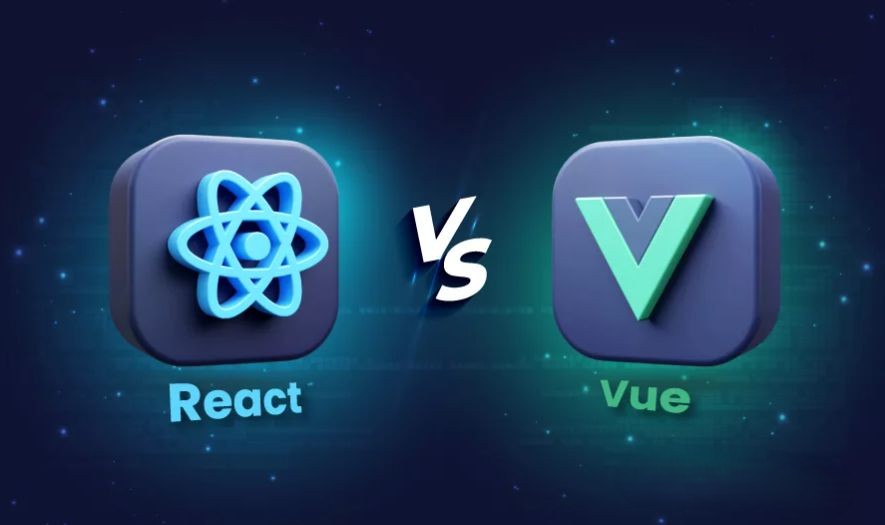When it comes to modern front-end development, React vs Vue.js are two of the most popular JavaScript libraries/frameworks. Both have their strengths and weaknesses, making the choice between them dependent on various factors such as project requirements, team expertise, and long-term maintainability. In this article, we will compare React and Vue in depth, covering key aspects like architecture, performance, ecosystem, learning curve, and real-world use cases.
1. Overview of React and Vue
React
- Developed and maintained by Meta (Facebook).
- Introduced in 2013.
- A component-based JavaScript library for building user interfaces.
- Uses JSX (JavaScript XML) for templating.
- Provides a virtual DOM for efficient updates and rendering.
- Backed by a large community and corporate adoption.
Vue.js
- Developed and maintained by Evan You.
- Introduced in 2014.
- A progressive framework for building user interfaces.
- Uses HTML-based templates (with optional JSX support).
- Provides a reactivity system using Vue’s Composition API or Options API.
- Known for simplicity and ease of learning.
2. Architecture & Core Concepts
React vs Vue
| Feature | React | Vue |
|---|---|---|
| Core Philosophy | UI-centric library | Progressive framework |
| State Management | useState, useReducer, Context API, Redux | Vuex, Pinia, Composition API |
| Templating | JSX (JavaScript syntax extension) | HTML templates with directives |
| Component Structure | Functional and class-based components | Options API and Composition API |
| Reactivity | Hooks for state management | Reactive data properties |
React Architecture
React follows a component-based architecture where components can be functional (with Hooks) or class-based. The core idea is that UI is a function of state (UI = f(state)).
React vs Vue
Vue Architecture
Vue follows an MVVM (Model-View-ViewModel) architecture, focusing on a declarative and reactive approach. It provides two styles: Options API (traditional object-based approach) and Composition API (for better reusability and TypeScript integration).
3. Performance Comparison
Both React and Vue are highly optimized for performance. However, certain differences exist:
- React’s Virtual DOM ensures efficient updates but can sometimes cause unnecessary re-renders if not optimized properly.
- Vue’s Reactivity System enables automatic dependency tracking, making updates more efficient in many cases.
- Bundle Size: Vue’s core is smaller (~33KB) compared to React (~45KB with ReactDOM), though tree-shaking can reduce unused code.
- Hydration Speed: Vue 3’s optimized rendering and reactivity engine make it slightly faster for server-side rendering (SSR).
React vs Vue
4. Ecosystem & Tooling
Both frameworks have rich ecosystems and extensive tooling support.
| Feature | React | Vue |
|---|---|---|
| State Management | Redux, MobX, Recoil | Vuex, Pinia |
| Routing | React Router | Vue Router |
| Server-Side Rendering (SSR) | Next.js | Nuxt.js |
| Mobile Development | React Native | NativeScript, Quasar |
| IDE Support | Excellent in VS Code, WebStorm | Excellent in VS Code, WebStorm |
| DevTools | React DevTools | Vue DevTools |
5. Learning Curve & Developer Experience

React vs Vue
React
- JSX can be confusing for beginners.
- Requires understanding of state, props, hooks (useState, useEffect, useContext).
- More freedom but requires architectural decisions (e.g., state management choice).
- Large community and extensive documentation.
Vue
- Easier to learn due to HTML-based templates and simpler concepts.
- Composition API in Vue 3 introduces functional programming concepts.
- Seamless integration into existing projects (useful for migration).
- Well-structured official documentation.
6. Community & Corporate Adoption
| Factor | React | Vue |
|---|---|---|
| Maintainer | Meta (Facebook) | Evan You & Open Source Contributors |
| Community Support | Larger, backed by major corporations | Growing, widely used in Asia |
| Corporate Adoption | Facebook, Instagram, Airbnb, Uber, Netflix | Alibaba, Xiaomi, GitLab, Adobe |
React vs Vue
7. Use Cases & When to Choose
Choose React if:
- You need high scalability (e.g., enterprise applications).
- You want to build a cross-platform mobile app (React Native).
- Your team is already familiar with JSX and Hooks.
- You are working on a project requiring strong server-side rendering (SSR) (Next.js).
Choose Vue if:
- You want a simple, lightweight framework for a small to medium-sized project.
- You prefer HTML-based templates over JSX.
- You need a faster learning curve and quick onboarding for new developers.
- You are targeting markets where Vue is popular (e.g., China, Japan).
React vs Vue
8. Conclusion
Both React and Vue are excellent choices for front-end development, and the decision depends on your project needs and team expertise.
- React is more versatile, backed by a large ecosystem, and preferred for complex applications.
- Vue is easier to learn, integrates well with existing projects, and offers a smooth developer experience.
Ultimately, both technologies are powerful, flexible, and future-proof, ensuring that whatever choice you make, you’ll be working with a reliable and well-supported ecosystem.
React vs Vue
Table of Contents
React vs Vue


1 comment
Shikshatech is a fantastic solution for developers seeking reliable support and integrated tools when working with modern frontend frameworks like React and Vue. It offers comprehensive resources and expert assistance that can greatly simplify project development and optimise workflow efficiency. I highly recommend ernestopro.com for anyone aiming to enhance their frontend development experience.